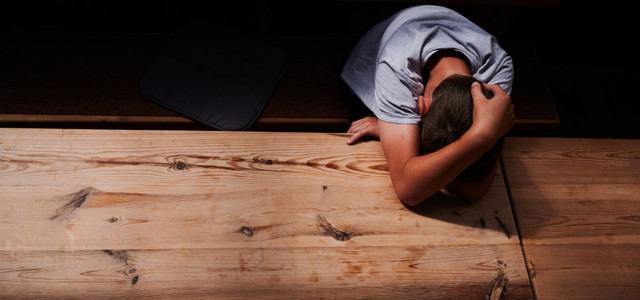
It doesn’t have to be loud slurping of soup or cracking of chips. For some people, just eating mashed potatoes is hell. Misophonia is the technical term, the suffering of those affected is high.
The squeaky chalk on the blackboard. Styrofoam rubbing together. The high-pitched buzzing of the dentist’s drill. Everyone knows noises that make the hairs on the back of your neck stand up and give you uncomfortable goosebumps.
But there are people who not only have to shake themselves briefly, but also suffer immensely. Experts call this hatred of sounds misophonia. The term comes from the Greek: “misos” for hate and “phone” for noise. Those affected can hardly endure eating noises in particular.
“You can describe it as saying that some people are less able to stand certain noises,” says Anne Möllmann. She is a psychological psychotherapist and director of studies at the University of Bielefeld.
Five percent of the population could be affected
Psychologists have been researching the disorder there since 2014, which is not yet officially recognized as a disease, but which, according to Anne Möllmann, is “really a common phenomenon”. It is estimated that five percent of the population could be affected by misophonia.
What constitutes misophonia: Those affected are not only annoyed by the noises that others make, they also feel anger, disgust and aggression. “Physical reactions such as palpitations, sweating or nausea are not uncommon,” says naturopath Andreas Seebeck from Dinklage.
He has specialized in the treatment of misophonia for eight years. Because his son suffered from it at the age of twelve and could hardly bear the chewing noises of his mother. “We were pretty much at the end. That was a huge burden,” says Andreas Seebeck.
In addition, feelings of guilt often torment
Incidentally, it is typical that misophonia usually does not refer to strangers – for example in the canteen or pizzeria – but to people who are close. “It’s really very stressful for everyone involved, because it’s often people you love and with whom you spend a lot of time,” says Anne Möllmann.
If you have the impression that you can no longer tolerate the person you are talking to because of the noise of food, this often amounts to a strong feeling of guilt. Especially when you feel these negative feelings towards your partner.
However, the researchers now know that misophonia is not a sign of problems in interpersonal relationships that have built up over the years. Even children can be affected. Anne Möllmann is currently conducting a study aimed specifically at children and parents.
The causes are still unclear
Because many questions are still open – for example, why certain noises become horrific for some people. According to Anne Möllmann, one thing is clear: the symptoms do not come from the ears. Rather, there seem to be differences in how the sounds are processed on their way to the brain. This can result in strong reactions “that are completely inappropriate for what is happening”.
According to Andreas Seebeck, classical conditioning, i.e. a learned stimulus-response pattern, also seems to play a role. A typical situation at the dining table could be responsible for this: when the children have to stay seated even though they’ve already finished – and then get in a bad mood.
“If they then only hear the chewing noises of the family members, this simply leads to a sensitization to exactly those noises that they then hear.” Which of course has nothing to do with the fact that the person who is there softly munching or crunching do not like.
According to Seebeck, the very first step in preventing misophonia in the long term is very easy: “Parents only have to allow their children to get up from the table. Very, very many cases would simply be avoided.”
Because Seebeck is convinced that those affected do not have to learn to endure situations with unpleasant eating noises. It is true that anxiety disorders are intensified if you avoid certain situations. With misophonia, however, it is different, according to Seebeck. Because the longer misophoniacs are exposed to the food situation, the more they feel an “endless anger”.
With headphones at the dining table
So what can you do about misophonia at the dinner table? Anne Möllmann reports that headphones, earplugs or background music help many of those affected – at least temporarily.
Basically, you have to think together in the family or partnership how the food situation can be designed so that those affected can bear it better.
Some families eat separately. “It’s not a cheap strategy because people would generally prefer to spend that time together. But we don’t advise against it if there are times when there’s no other way,” says Möllmann.
The level of suffering for those affected is very high
Because the level of suffering for those affected is very high, the scientist believes that psychotherapeutic treatment makes sense. “In any case, this clinical picture should be taken seriously,” she says. In the meantime, research has established that untreated misophonia can lead to side effects and consequences. They can also cause social anxiety and depression.
If you have acute depressive or suicidal thoughts, contact the telephone counseling online or on Tel. 0800 / 111 0 111 or 0800 / 111 0 222 or 116123. The German Depression Aid on Tel. 0800 / 33 44 533 will also help. In emergencies, please contact the nearest psychiatric clinic or the emergency doctor on Tel. 112.
Read more on Techzle\.com:
- Study: Social inequality influences risk of developing cancer
- Rainy summer: How climate change is distorting our expectations
- Stye won’t go away? It could be skin cancer